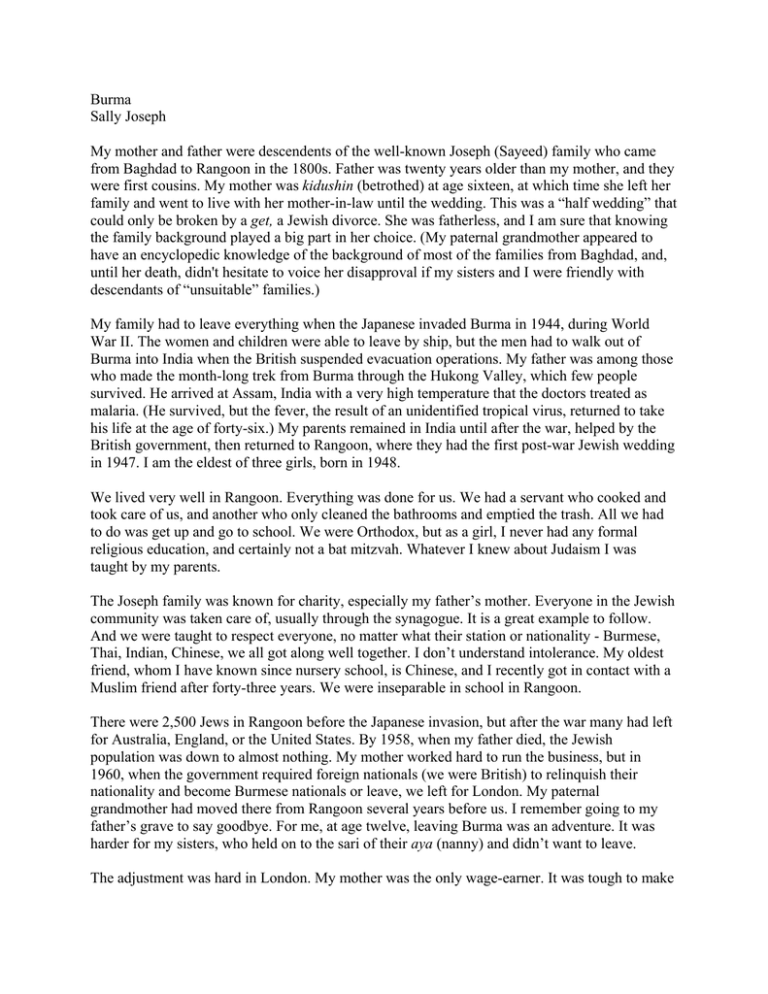Burma Sally Joseph
advertisement

Burma Sally Joseph My mother and father were descendents of the well-known Joseph (Sayeed) family who came from Baghdad to Rangoon in the 1800s. Father was twenty years older than my mother, and they were first cousins. My mother was kidushin (betrothed) at age sixteen, at which time she left her family and went to live with her mother-in-law until the wedding. This was a “half wedding” that could only be broken by a get, a Jewish divorce. She was fatherless, and I am sure that knowing the family background played a big part in her choice. (My paternal grandmother appeared to have an encyclopedic knowledge of the background of most of the families from Baghdad, and, until her death, didn't hesitate to voice her disapproval if my sisters and I were friendly with descendants of “unsuitable” families.) My family had to leave everything when the Japanese invaded Burma in 1944, during World War II. The women and children were able to leave by ship, but the men had to walk out of Burma into India when the British suspended evacuation operations. My father was among those who made the month-long trek from Burma through the Hukong Valley, which few people survived. He arrived at Assam, India with a very high temperature that the doctors treated as malaria. (He survived, but the fever, the result of an unidentified tropical virus, returned to take his life at the age of forty-six.) My parents remained in India until after the war, helped by the British government, then returned to Rangoon, where they had the first post-war Jewish wedding in 1947. I am the eldest of three girls, born in 1948. We lived very well in Rangoon. Everything was done for us. We had a servant who cooked and took care of us, and another who only cleaned the bathrooms and emptied the trash. All we had to do was get up and go to school. We were Orthodox, but as a girl, I never had any formal religious education, and certainly not a bat mitzvah. Whatever I knew about Judaism I was taught by my parents. The Joseph family was known for charity, especially my father’s mother. Everyone in the Jewish community was taken care of, usually through the synagogue. It is a great example to follow. And we were taught to respect everyone, no matter what their station or nationality - Burmese, Thai, Indian, Chinese, we all got along well together. I don’t understand intolerance. My oldest friend, whom I have known since nursery school, is Chinese, and I recently got in contact with a Muslim friend after forty-three years. We were inseparable in school in Rangoon. There were 2,500 Jews in Rangoon before the Japanese invasion, but after the war many had left for Australia, England, or the United States. By 1958, when my father died, the Jewish population was down to almost nothing. My mother worked hard to run the business, but in 1960, when the government required foreign nationals (we were British) to relinquish their nationality and become Burmese nationals or leave, we left for London. My paternal grandmother had moved there from Rangoon several years before us. I remember going to my father’s grave to say goodbye. For me, at age twelve, leaving Burma was an adventure. It was harder for my sisters, who held on to the sari of their aya (nanny) and didn’t want to leave. The adjustment was hard in London. My mother was the only wage-earner. It was tough to make a pound go far, and we were never happy because of the weather. My mother used to buy fruit once a week, and I remember her saying, “Girls, you can eat this all at once, or save some for the rest of the week.” Without servants, we learned to do everything for ourselves. Finally, when I was twenty-one, a year after my mother and sister had left London (sponsored by my mother’s cousin), my youngest sister and I followed them to Los Angeles. I am very lucky with my family. I’ve always lived with my mom, Florence Shamash, who is a young seventy-three, very contemporary and understanding. The word “can’t” does not appear in her dictionary. She is well-known in the Sephardic community. When she came to the US in 1969, our cousin, then President of Kahal Joseph Congregation, asked my mother to get a women’s group off the ground. Before this, different groups - women from India, Indonesia, Singapore, Rangoon - kept to themselves. Now, they all work together, and their children have grown up together. My mother also helped start the Sephardic Jewish day school, Maimonides School; has been active with the United Jewish Fund Sephardic Women for the last twenty-five years; and still works full time. In this environment, it was inevitable that I would also be active in our community. For several years, I edited the community’s newsletter with our rabbi and served as Secretary of the Sisterhood committee. From time to time there are b’not mitzvah at Kahal Joseph. It does not appear to be the norm in our community, but if girls have attended Ashkenazic parochial schools, they tend to follow that tradition and have a bat mitzvah. At Kahal Joseph, the bat mitzvah girl usually gives a speech, including a dvar Torah about the Torah portion that week, followed by a luncheon or whatever celebration the family plans. A few years ago, my mother organized a group to go to Rangoon for a visit, but in the end, they were advised not to go because of the political situation. The Burmese are a gentle, wonderful people, and it is so sad that they are suffering under the current regime. The synagogue is still there, well taken care of, we hear, as well as the Jewish cemetery. My family left considerable property in Rangoon. I have no great desire to go back, but if my mother decides to go in the future, I will, too. I am grateful for my experiences there, but sometimes, when I think about my life in Rangoon, I wonder: did that really happen to me?

